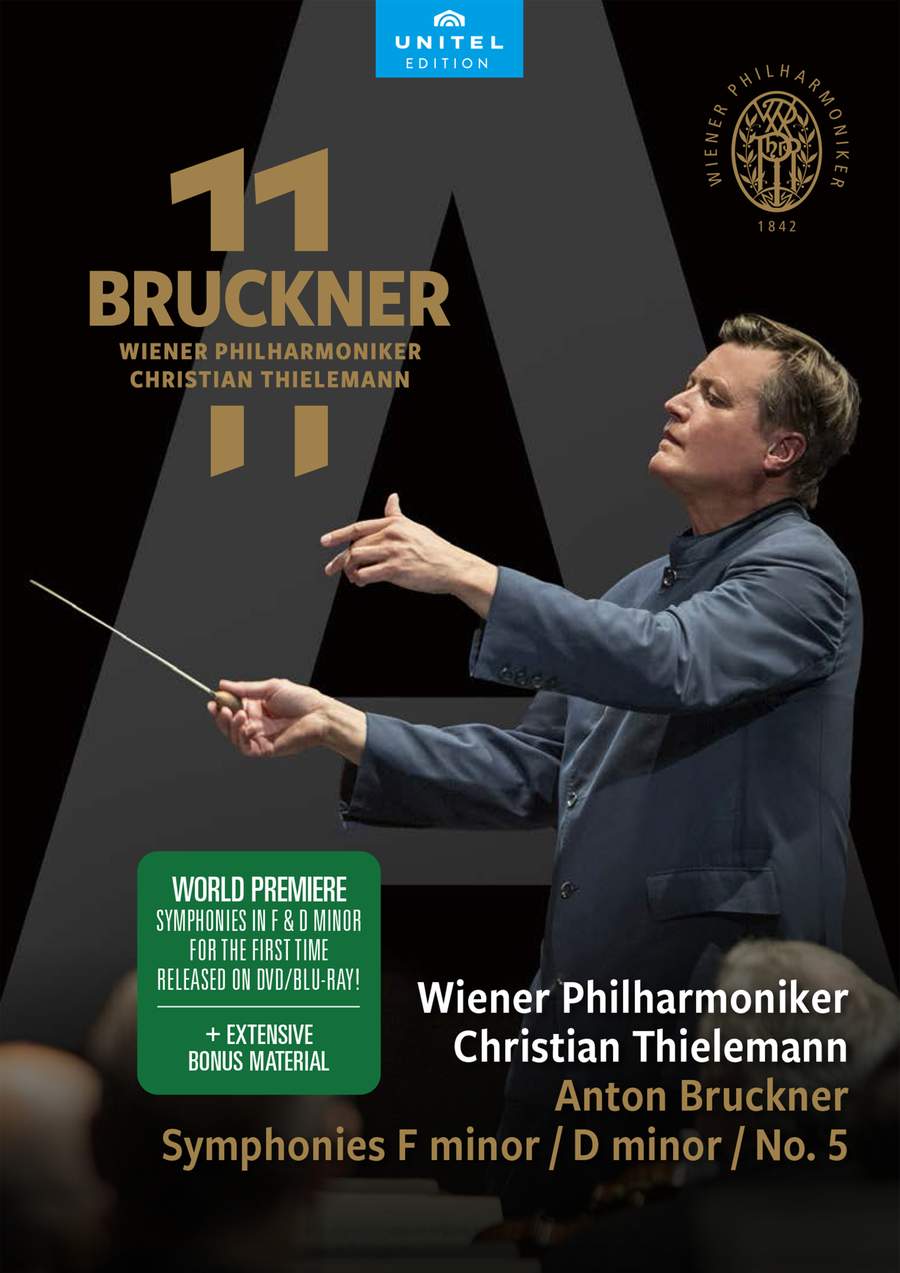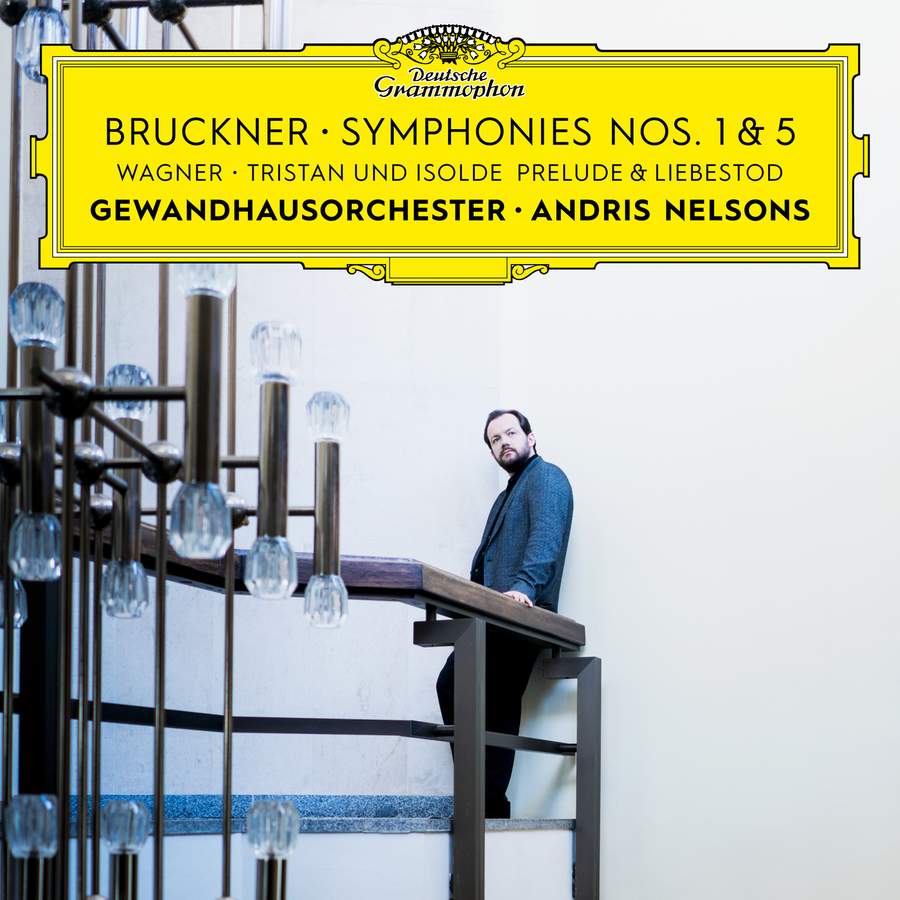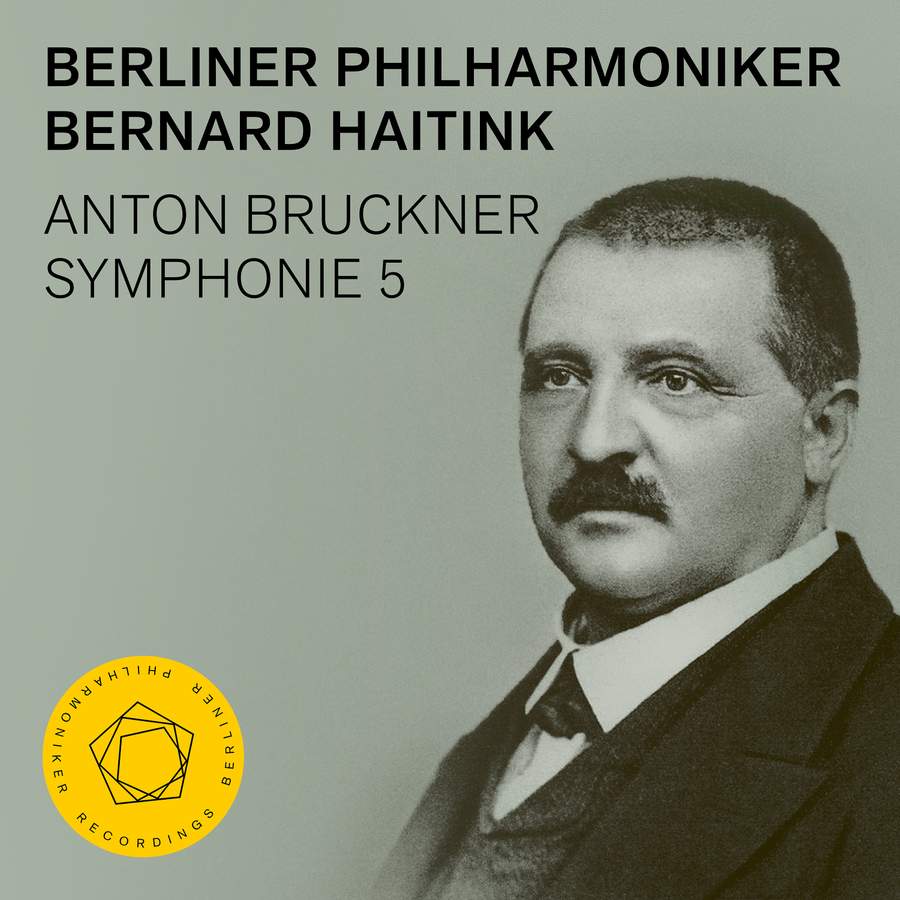Orchestral Focus: Bruckner Symphonies
View record and artist detailsRecord and Artist Details
Genre:
Orchestral
Label: Unitel Editions
Magazine Review Date: 10/2022
Media Format: Digital Versatile Disc
Media Runtime: 176
Mastering:
DDD
Catalogue Number: 806708

Tracks:
| Composition | Artist Credit |
|---|---|
| Symphony No. 00, 'Study Symphony' |
Anton Bruckner, Composer
Christian Thielemann, Conductor Vienna Philharmonic Orchestra |
| Symphony No. 0, 'Nullte' |
Anton Bruckner, Composer
Christian Thielemann, Conductor Vienna Philharmonic Orchestra |
| Symphony No. 5 |
Anton Bruckner, Composer
Christian Thielemann, Conductor Vienna Philharmonic Orchestra |
Genre:
Orchestral
Label: Deutsche Grammophon
Magazine Review Date: 10/2022
Media Format: CD or Download
Media Runtime: 147
Mastering:
DDD
Catalogue Number: 486 2083

Tracks:
| Composition | Artist Credit |
|---|---|
| Tristan und Isolde, Movement: Prelude and Liebestod (concert version: arr. Humpe |
Richard Wagner, Composer
Andris Nelsons, Conductor Leipzig Gewandhaus Orchestra |
| Symphony No. 1 |
Anton Bruckner, Composer
Andris Nelsons, Conductor Leipzig Gewandhaus Orchestra |
| Symphony No. 5 |
Anton Bruckner, Composer
Andris Nelsons, Conductor Leipzig Gewandhaus Orchestra |
Genre:
Orchestral
Label: Berlin Philharmoniker
Magazine Review Date: 10/2022
Media Format: Download
Media Runtime: 75
Mastering:
DDD
Catalogue Number: BPHR1902845

Tracks:
| Composition | Artist Credit |
|---|---|
| Symphony No. 5 |
Anton Bruckner, Composer
Berlin Philharmonic Orchestra Bernard Haitink, Conductor |
Genre:
Orchestral
Label: Sony Classical
Magazine Review Date: 10/2022
Media Format: CD or Download
Media Runtime: 82
Mastering:
DDD
Catalogue Number: 19658 70614-2

Tracks:
| Composition | Artist Credit |
|---|---|
| Symphony No. 5 |
Anton Bruckner, Composer
Christian Thielemann, Conductor Vienna Philharmonic Orchestra |
Author: Richard Osborne
‘Revaluation’ and ‘revelation’ are the words that most immediately come to mind in response to this remarkable release in Unitel’s cycle of all 11 Bruckner symphonies, which Christian Thielemann and the Vienna Philharmonic have been filming and recording ahead of the bicentenary of the composer’s birth in 2024.
I say 11 symphonies because Thielemann has no truck with the idea that the two earliest symphonies are unworthy of inclusion in the canon. What these wonder-filled performances oblige us to do is forget those demeaning sobriquets – ‘Symphony No 00’ (the F minor Symphony, 1863), ‘Symphony No 0’ (the D minor Symphony, 1864-65, rev 1869) – with which Bruckner and his advisors so damagingly saddled them. Here, in performances of rare empathy and recreative skill, both works emerge as harbingers of miracles yet to come.
Thielemann talks of the ‘southern verve’ of the F minor Symphony. The mood of the teenage symphonies of Mendelssohn and Bizet comes to mind here; the only difference being that Bruckner was 39 when he completed the symphony. His knowledge of the German symphonic repertory and his mastery of the organ go some way to explaining the confidence of the writing and accomplishment of the orchestration. This also happens to be the only Bruckner symphony, Thielemann notes during 80 minutes of conversation with Austrian Radio’s splendidly Pickwickian senior music editor, that has no trace of a chorale in it.
It’s a happy chance, perhaps, that the Vienna Philharmonic was denied the opportunity to play either work in the 1860s – or later, until Thielemann came knocking. Not the least of the joys of this DVD is the relish with which this greatest of Bruckner orchestras sets about giving voice to this all too belated bequest.
The F minor Symphony has been recorded, albeit less frequently than the more recognisably ‘Brucknerian’ D minor. (It was Deryck Cooke who suggested that the latter was not so much discarded as absorbed into Bruckner’s first official D minor symphony, the Third, in 1873.) If none of those earlier LP or CD recordings holds a candle to these new performances, it’s because of the collaborative nature of the Viennese music-making: precision of execution married to a joyous sense of on-the-spot discovery.
For the two early symphonies, it’s the elite members of the Vienna Philharmonic itself who are on show, playing the symphonies with all the freshness and guile of practised chamber musicians. For the mighty Fifth, it’s the full panoply of the orchestra you might hear in a Wagner evening at the Vienna Opera that does the honours.
Thielemann has lived with the Fifth Symphony ever since he staggered out of the Berlin Philharmonie as a 16-year-old schoolboy in December 1976, having heard the work for the first time in one of the two concerts that Karajan and the Berliners gave at the time of their celebrated DG recording. If we track back to Karajan’s own first preserved account of the symphony in 1954, we find a journey – by no means straightforward – that’s not unlike the one Thielemann has made down the years in Munich and Dresden, culminating in this grand, life-enhancing harvest-home of a Viennese performance.
Nowadays Thielemann will tell you that the Fifth is not as difficult as it seems. What he means, I suspect, is that, though its technical challenges remain formidable, those shouldn’t blind us to the largely untroubled sense of affirmation the symphony offers.
In terms of tempos, Thielemann has broadened his approach to the largely unproblematic first movement. This plays well ‘live’ on film, though may test the patience of some collectors hearing Sony’s CD version. In the slow movement, the pulse is a touch more easeful than previously. The clock says 19 minutes, but it could be five minutes or 50 when time itself appears to stand still, as it does in this blissfully songful Viennese account.
The performances were filmed ‘as live’ but without an audience in Vienna’s Musikverein during one of those spaces the pandemic so conveniently provided. Audience-free, the Musikverein, like Amsterdam’s Concertgebouw, is a matchless recording venue. The unusual circumstance also gave a clear run to video director Benedict Mirow and his editor Jan von Stebut, whose work offers as lucid an account of the music and its realisation by a great orchestra as any I have yet encountered.
The Fifth Symphony, coupled with another youthful predecessor, rounds off Andris Nelsons’s nine-symphony Deutsche Grammophon Bruckner cycle with the Leipzig Gewandhaus Orchestra. It’s been a cycle with Wagnerian trimmings, as here where the symphonies are prefaced by the Prelude and Liebestod from Tristan und Isolde.
It’s an odd coupling, prompted by Bruckner’s having been in Munich in June 1865 for the premiere of Tristan, whose conductor Hans von Bülow showed genuine interest in the symphony on which Bruckner was currently working. Why, then, does Nelsons give us that First Symphony in its 1890-91 Vienna revision, rather the original 1866 ‘Linz’ version? The revision is a fussy affair that reflects poorly on Bruckner’s judgement and state of mind at the time. That said, it’s to Nelsons’s credit that this is as good an account of the revision as we are likely to hear, thanks to judicious tempos and the fineness of the Leipzig playing.
Transparent texturing and a superfine control of dynamics are also features of the new Leipzig Fifth. It may be a less Austrian-sounding rendering than the Vienna Philharmonic’s but the refinement of the playing is equally remarkable. What it is, alas, is a less patient performance – witness a fondness for unbidden accelerations during outer-movement development sections. Those between the finale’s stupendous merging of fugue and chorale and its recapitulation are particularly damaging. This is one of the quickest of all recorded accounts of this epic finale, often brazen-sounding and hard-edged, where it should glow like old gold.
Bernard Haitink’s 2011 account of the Fifth, originally released as part of a multi-conductor Berlin Bruckner cycle, is less successful, musically and technically, than his long-serving 1971 Concertgebouw version (Philips, 6/72). The relatively closed-in Philharmonie sound is no match for the spectacularly splendid recording on the new Thielemann and Nelsons releases, or for that which DG provided for Barenboim and his Staatskapelle Berlin in that same hall in 2010.
Discover the world's largest classical music catalogue with Presto Music.

Gramophone Digital Club
- Digital Edition
- Digital Archive
- Reviews Database
- Full website access
From £8.75 / month
Subscribe
Gramophone Full Club
- Print Edition
- Digital Edition
- Digital Archive
- Reviews Database
- Full website access
From £11.00 / month
Subscribe
If you are a library, university or other organisation that would be interested in an institutional subscription to Gramophone please click here for further information.





